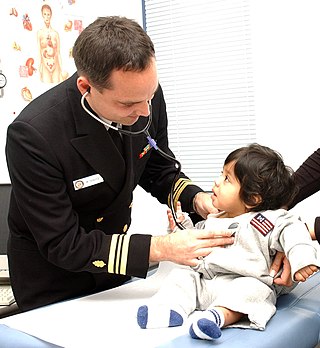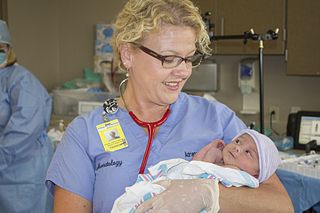Related Research Articles

A registered nurse (RN) is a nurse who has graduated or successfully passed a nursing program from a recognized nursing school and met the requirements outlined by a country, state, province or similar government-authorized licensing body to obtain a nursing license. An RN's scope of practice is determined by legislation, and is regulated by a professional body or council.
Psychiatric nursing or mental health nursing is the appointed position of a nurse that specialises in mental health, and cares for people of all ages experiencing mental illnesses or distress. These include: neurodevelopmental disorders, schizophrenia, schizoaffective disorder, mood disorders, addiction, anxiety disorders, personality disorders, eating disorders, suicidal thoughts, psychosis, paranoia, and self-harm.

A nurse practitioner (NP) is an advanced practice registered nurse and a type of mid-level practitioner. NPs are trained to assess patient needs, order and interpret diagnostic and laboratory tests, diagnose disease, prescribe medications and formulate treatment plans. NP training covers basic disease prevention, coordination of care, and health promotion.
An advanced practice nurse (APN) is a nurse with post-graduate education and training in nursing. Nurses practicing at this level may work in either a specialist or generalist capacity. APNs are prepared with advanced didactic and clinical education, knowledge, skills, and scope of practice in nursing.
Nursing credentials and certifications are the various credentials and certifications that a person must have to practice nursing legally. Nurses' postnominal letters reflect their credentials—that is, their achievements in nursing education, licensure, certification, and fellowship. The letters usually appear in the following order:

Vanderbilt University School of Nursing (VUSN) is a graduate school of Vanderbilt University, located in Nashville, Tennessee. VUSN is closely connected with its parent university and the separate nonprofit Vanderbilt University Medical Center. The School of Nursing is ranked in the top 10 in the U.S. News & World Report rankings. Additionally, its Masters of Science program is ranked 8th, and its Doctorate of Nursing practice program 6th in the report's 2022 graduate school rankings.
A mental health professional is a health care practitioner or social and human services provider who offers services for the purpose of improving an individual's mental health or to treat mental disorders. This broad category was developed as a name for community personnel who worked in the new community mental health agencies begun in the 1970s to assist individuals moving from state hospitals, to prevent admissions, and to provide support in homes, jobs, education, and community. These individuals were the forefront brigade to develop the community programs, which today may be referred to by names such as supported housing, psychiatric rehabilitation, supported or transitional employment, sheltered workshops, supported education, daily living skills, affirmative industries, dual diagnosis treatment, individual and family psychoeducation, adult day care, foster care, family services and mental health counseling.
The University of Virginia School of Nursing, established in 1901, is a school of nursing education. It has an enrollment of approximately 800 students, and is consistently rated in the top 4% of U.S. nursing schools. After the retirement of Dorrie K. Fontaine as the fifth dean of the School, two-term American Nurses Association President Pam Cipriano, a research faculty member at UVA for years, stepped in as interim dean in August 2019.
The American Nurses Credentialing Center (ANCC), a subsidiary of the American Nurses Association (ANA), is a certification body for nursing board certification and the largest certification body for advanced practice registered nurses in the United States, as of 2011 certifying over 75,000 APRNs, including nurse practitioners and clinical nurse specialists.

Nursing is a health care profession that "integrates the art and science of caring and focuses on the protection, promotion, and optimization of health and human functioning; prevention of illness and injury; facilitation of healing; and alleviation of suffering through compassionate presence". Nurses practice in many specialties with varying levels of certification and responsibility. Nurses comprise the largest component of most healthcare environments. Shortages of qualified nurses are found in many countries. Nurses collaborate with other healthcare providers such as physicians, nurse practitioners, physical therapists, and psychologists. There is a distinction between nurses and nurse practitioners; in the U.S., the latter are nurses with a graduate degree in advanced practice nursing, and are permitted to prescribe medications unlike the former. They practice independently in a variety of settings in more than half of the United States. Since the postwar period, nurse education has undergone a process of diversification towards advanced and specialized credentials, and many of the traditional regulations and provider roles are changing.

Nurses in Canada practise in a wide variety of settings, with various levels of training and experience. They provide evidence-based care and educate their patients about health and disease.
The Michigan State University College of Nursing is the nursing college at Michigan State University. It is located on the southeastern side of campus in East Lansing, Michigan, United States. The college is centered in the Life Sciences Building. The dean of the school is Leigh Small. The College of Nursing is among the top 100 graduate nursing programs in the country, ranking at #36 in the nation according to U.S. News & World Report. The College of Nursing at Michigan State University offers a professional student environment that fosters professional and personal development of pre-nursing and nursing students. The college shares the university's research, compassion, and high-achieving educational goals. The college provides several options to become a nurse or advance your nursing education. Those include: BSN Pathways, MSN concentrations, DNP program, PhD program and various continuing education opportunities.
The Jane and Robert Cizik School of Nursing at the University of Texas Health Science Center in Houston (UTHealth) is an American nursing education institution.
The American Psychiatric Nurses Association (APNA) is a professional association of psychiatric-mental health nurses. Founded in 1986, it provides continuing education and a range of professional services to a membership of more than 9000 nurses. It publishes position papers on mental health issues and the care of persons with psychiatric disorders.
Rocky Mountain University of Health Professions (RMUoHP) is a private, for-profit university focused on graduate healthcare education and located in Provo, Utah. It was established in 1998 and is accredited by the Northwest Commission of Colleges and Universities.
The Hunter-Bellevue School of Nursing (HBSON) is the nursing school of Hunter College, a public university that is a constituent organization of the City University of New York (CUNY). It is located on the Brookdale Campus, at East 25th Street and 1st Avenue in Kips Bay, near Bellevue Hospital. The school is the flagship nursing program for CUNY.
A pediatric nurse practitioner (PNP) is a nurse practitioner who specializes in care for newborns, infants, toddlers, pre-schoolers, school-aged children, adolescents, and young adults. Nurse practitioners have an in-depth knowledge and experience in pediatric healthcare including well childcare, and prevention/management of common pediatric acute illnesses and chronic conditions. This care is provided to support optimal health of children within the context of their family, community, and environmental setting. In order to be a pediatric nurse practitioner one must be compassionate, resourceful, good at communicating and have good attention to detail.

A neonatal nurse practitioner (NNP) is an advanced practice registered nurse (APRN) with at least 2 years experience as a bedside registered nurse in a Level III NICU, who is prepared to practice across the continuum, providing primary, acute, chronic, and critical care to neonates, infants, and toddlers through age 2. Primarily working in neonatal intensive care unit (NICU) settings, NNPs select and perform clinically indicated advanced diagnostic and therapeutic invasive procedures. In the United States, a board certified neonatal nurse practitioner (NNP-BC) is an APRN who has acquired Graduate education at the master's or doctoral level and has a board certification in neonatology. The National Association of Neonatal Nurse Practitioners (NANNP) is the national association that represents neonatal nurse practitioners in the United States. Certification is governed by the National Certification Corporation for Obstetrics, Gynecologic and Neonatal Nursing Specialties (NCC).
An adult-gerontology nurse practitioner (AGNP) is a nurse practitioner that specializes in continuing and comprehensive healthcare for adults across the lifespan from adolescence to old age.
Nursing is the largest healthcare profession in the United States, with more than 3.1 million registered nurses. Between 2012 and 2022, employment for nurses is projected to grow by 19 percent, which is more than any other profession. Nurses make up the largest component of staff in hospitals but are also able to provide care in clinic settings, patient's homes, schools, nursing homes, public health agencies, and mental health centers. In addition, nurses can be found in the military, in industry, nursing education, and do health care research. Nurses in these various roles and settings can provide direct patient care and case management, but also develop and establish nursing practice and quality standards within complex healthcare systems. As each degree can provide a different level of care for patients and function in vastly different roles, it is important to differentiate between them. The levels of nursing degrees have different educational requirements, licensure, and credentialing that can vary state to state.
References
- ↑ "Psychiatric Mental Health NP Competencies" (PDF). American Psychiatric Nurses Association. Retrieved 8 October 2020.
- ↑ "State Practice Environment". American Association of Nurse Practitioners. 2023. Retrieved April 23, 2024.
- ↑ "Editorial: Make better use of nurse practitioners - Editorials - the Sacramento Bee". Archived from the original on 2013-09-27. Retrieved 2013-06-05.
- ↑ "FAQs about Advanced Practice Psychiatric Nurses - American Psychiatric Nurses Association". www.apna.org. Retrieved 2016-11-08.
- ↑ "How to Become a Psychiatric Nurse Practitioner (PMHNP)". Nursing License Map. Retrieved 2022-03-07.
- ↑ The State of California. (2007, January 22). California Board of Registered Nursing Retrieved February 9, 2007, from "California Board of Registered Nursing - Nurse Practitioners". Archived from the original on 2007-01-24. Retrieved 2007-02-09.
- ↑ "Psychiatric-Mental Health Nursing Graduate Programs by State - American Psychiatric Nurses Association". www.apna.org.
- ↑ "The American Association of Colleges of Nursing (AACN)". www.aacnnursing.org.
- ↑ University of California, San Francisco. (2007, February 6). MS Specialty: Advanced Practice Psychiatric Nursing - UCSF School of Nursing Retrieved February 9, 2007, from http://nurseweb.ucsf.edu/www/spec-psy.htm
- ↑ "25 Qualities that Make a Good Nurse Practitioner". www.nursingprocess.org. Retrieved 2022-03-31.
- ↑ "Psychiatric-Mental Health Nursing - Psychiatric Nursing". APNA. Retrieved 2022-03-07.
- 1 2 eCareers, Health. "6 Subspecialties for Psychiatric Nurse Practitioners". healthecareers.com. Retrieved 2022-03-07.
- ↑ "What is Addiction Medicine? | NYSAM". New York Society of Addiction Medicine. Retrieved 2022-03-07.
- ↑ "Forensic psychiatry". Health Careers. 2015-04-07. Retrieved 2022-03-07.
- ↑ "Online Nursing Programs | Wilkes University Online". onlinenursingdegrees.wilkes.edu. Retrieved 2022-03-31.
- 1 2 3 "What Do Psychiatric Mental Health Nurse Practitioners Do?". St. Thomas University Online. Retrieved 2022-03-07.
- 1 2 3 4 5 "The State of Mental Health in America". Mental Health America. Retrieved 2022-03-31.
- 1 2 3 "Nurse Practitioner Contract Negotiation Tips & Resources | Duquesne University". Duquesne University School of Nursing. 2021-02-08. Retrieved 2022-03-31.
- ↑ "Psychiatric Nurse Practitioner Salary in 2022". www.nursingprocess.org. Retrieved 2022-03-31.
- ↑ "Psychiatric Nurse Salary Guide | NurseJournal.org". NurseJournal. 2022-01-26. Retrieved 2022-03-31.